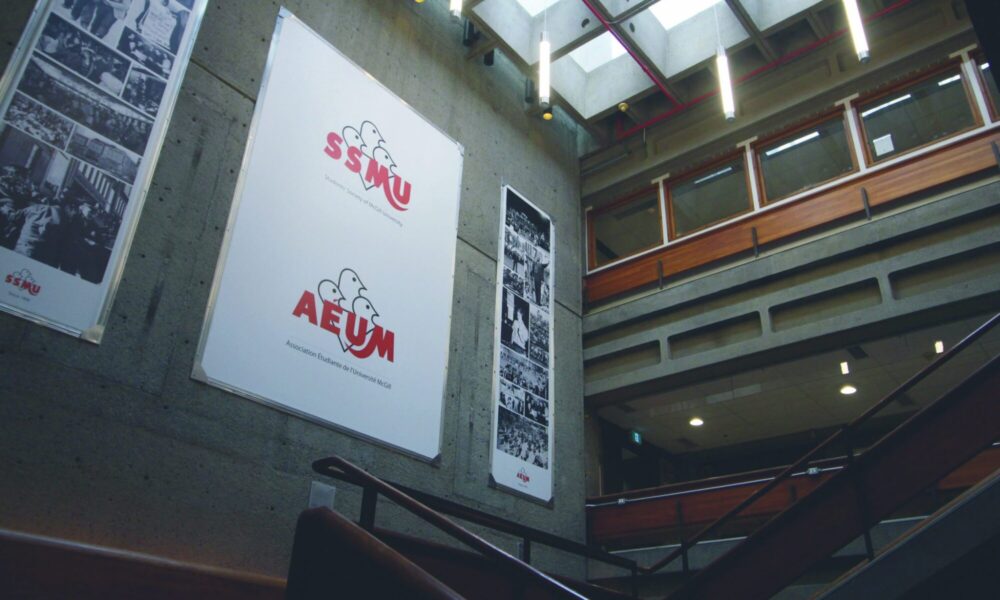At a Students’ Society of McGill University (SSMU) General Assembly (GA) on Dec. 5, 356 undergraduate students passed a motion of impeachment against SSMU President Dymetri Taylor. The motion called for a referendum on the question of whether or not to remove Taylor from office on the grounds of impropriety and mishandling of duties. The motion claimed that Taylor obstructed the society’s democratic process by misrepresenting its legal limitations.
150 undergraduate students signed a motion submitted by a member of Students’ for Palestine’s Honour and Resistance (SPHR) at McGill to SSMU on Nov. 5, requesting a Special Strike GA to vote on whether constituents would participate in an international student strike for Palestine. SSMU’s Steering Committee denied this motion on Nov. 6, claiming that the wording was nearly identical to that of the Policy Against Against Genocide In Palestine (PAGIP)—a policy passed in the Fall 2023 referendum and subsequently suspended in an injunction, impeding SSMU’s ratification. The Steering Committee claimed that because of the similarities in wording, the motion seeking to hold a referendum on the strike would therefore be liable to the same injunction constraints, making it illegal to pursue under Quebec law. Taylor then stated that for SSMU to facilitate the GA the language changed in the motion would result in it having nothing to do with solidarity for Palestine, stating that otherwise he and SSMU could be held legally responsible for violating the injunction restraints.
SPHR put forth a revised motion on Nov. 13. SSMU rendered the motion null, stating that the time required to ensure it did not violate the injunction would make it no longer feasible to hold a Special Strike GA and a referendum vote before the organized international strike began on Nov. 21.
On Nov. 27, an anonymous source claiming to be a former member of SSMU’s 2023-2024 executive board sent an email to SPHR, The McGill Daily, and The Tribune expressing concern that Taylor had misrepresented SSMU’s ability to take a stance on the genocide in Palestine in his refusal of the Special Strike GA motion. The source also provided a legal advice document from SSMU’s lawyers, including advice received on Palestine-related issues. As the former board member noted, the document outlined that SSMU and its executives could organize and participate in events showing support for Palestine without violating the injunction as long as they used terms other than those used in the PAGIP.
“No board member or Officer of the Society should therefore be making the claim that the court order against the [PAGIP] constitutes a blanket ban on SSMU taking Palestine-related positions,” the former board member wrote. “They CERTAINLY should not be using this excuse to block students from exercising their constitutionally-mandated, democratic prerogatives.”
Outside of the Special Strike GA motion submitted, which called for all undergraduate students to strike, individual student societies such as the McGill Students’ Geography Society (MUGS), Philosophy Students’ Association (PSA), and Anthropology Students’ Association (ASA) held GAs which passed a motion to picket classes on Nov. 21 and 22.
The student who put forward the motion of impeachment presented the case at the GA on Dec. 5, outlining how SSMU’s non-participation in the Student Strike for Palestine affected SPHR’s movement.
“This strike motion should have placed the entire SSMU student body on strike for Palestine during the week of Nov. 21 [….] This was a historic landmark for the student movement for Palestine and Montreal. Dymetri [Taylor] knew this and denied students the right to take action,” the student said at the GA. “This constitutes an undeniable abuse of power.”
In an interview with The Tribune, Taylor explained that he had misunderstood SSMU’s capacity to support Palestine due to in-person legal advice given during and before the interrogation and examination of the PAGIP injunction, which didn’t align with the legal advice given on paper. As such, he stated that the charges made against him in the impeachment motion didn’t reflect the intent of his actions.
“Delinquency of duty, more or less, means I’m not doing my job. Impropriety means I’m purposely lying. I’m not lying when I’m saying that I did generally think and misunderstand as to the ramifications of the ‘Policy Against Genocide’ versus going on strike,” Taylor said. “I have spent around 60 to 70 hours a week in this office just trying to do what I can. […] I’m a student. I make mistakes. I’m not infallible.”
He further stated that if he remains in office, he intends to address his past actions and regain the student body’s trust through working with an Accountability Coordinator.
“There’s other things than going straight to impeachment. We have the accountability committee for a reason,” said Taylor. “And while I have my own ideas as to what I can do, I’d ask what would you [the accountability committee] recommend or mandate that I have to do to ensure that this isn’t happening?”
An SPHR representative spoke in favour of Dyemtri’s removal in an interview with The Tribune, stating that SSMU had a responsibility to represent students’ voices on Palestine-related issues when asked and able.
“The problem we have now is that our student union functions more like a corporation than a real representative body,” the representative said. “The SSMU can publicly take a stand in support of students and their fight for divestment […] as well as operate as an organized channel through which students can do actions like striking or boycotts or otherwise organized acts of solidarity.”
On Dec. 17, SSMU announced that students voted not to impeach Taylor with 58.6 per cent of the vote in the referendum. A total of 16.9 per cent of the student constituency cast a ballot. Taylor will thus continue his tenure.







